
AI Slop in Marketing Isn’t Failure: Ketepa, NTSA, and the Messy Middle
TLDR: AI-generated marketing can misfire — or create what’s called AI slop. Ketepa Tea, NTSA, and Coca-Cola show how public feedback and iteration turn AI missteps into stronger campaigns.
February is the month of love, a season when brands lean heavily into emotion, gifting, and cultural moments. This year in Kenya, however, Valentine’s conversations went beyond flowers and chocolates. The Central Bank of Kenya cautioned against the misuse of banknotes amid the growing trend of money bouquets, highlighting how cultural moments, regulations, and public behavior intersect.
Against this backdrop, brands and public institutions turned to AI-generated images to participate in the moment. Ketepa Tea shared an AI-generated image of tea sachets arranged as a bouquet, prompting criticism around tone, timing, and authenticity.
Around the same time, the National Transport and Safety Authority (NTSA) faced backlash after publishing an AI-generated #UsalamaBarabarani image that appeared to contradict its own road safety message. In both cases, audiences quickly identified the gaps and voiced their feedback.
These moments sparked a broader conversation about AI-generated images and videos in marketing and the growing phenomenon often referred to as AI slop. More than isolated missteps, they reveal how brands are learning to use AI in public — navigating feedback, iterating in real time, and refining their approach as audiences become more AI-aware.
What is AI slop in Marketing?
AI slop refers to low-quality, obviously AI-generated content that fails authenticity tests and lacks the human oversight necessary for quality marketing. It is characterized by visual tells like distorted hands, impossible physics, nonsensical text, and, perhaps most critically, missing cultural context that make content resonate.
AI slop is not simply “bad content.” It often results from:
- Over-reliance on AI tools
- Weak or rushed prompting
- Limited human oversight
- Speed prioritized over strategy
Crucially, AI slop reflects process gaps, not proof that AI itself does not work. Many of these outputs are not failures, but early-stage experiments published too quickly.
But here’s what makes AI slop particularly problematic in 2025: today’s consumers are AI-literate. They can spot it instantly, and they expect better.
Why AI Slop Happens, Especially With Images and Video
AI slop is most visible in visual marketing for several reasons.
First, AI lacks lived context. Generative tools do not understand cultural nuance, regulation, emotion, or local realities. They work from patterns, not experience. Without human review, inconsistencies slip through.
Second, AI accelerates execution faster than judgment. What once took days of creative review can now be produced in minutes. When thinking does not keep pace with production, mistakes become public.
Third, visual content leaves no room for explanation. Audiences interpret images instantly. A single contradiction can undermine an entire message.
A Global Example: Coca-Cola’s Christmas Controversy and AI-Generated Creativity
In 2024 and 2025, Coca-Cola attempted to recreate its iconic “Holidays Are Coming” Christmas campaign using AI generation. The result? A soulless recreation that lost all the warmth and nostalgia of the beloved hand-crafted original. Visible AI artifacts and uncanny valley effects prompted hashtags like #BoycottCokeAI to trend. The message from consumers was clear: when you’re a heritage brand built on emotion, AI cost-cutting feels like betrayal.
Kenyan Case Study: NTSA and the #UsalamaBarabarani Campaign
Kenya’s National Transport and Safety Authority’s campaign #Safewalking #UsalamaBarabarani (Road Safety) campaign, advocating for zebra crossing usage, offers a clear example of contextual misalignment.
One of their AI-generated image shared on social media showed both a zebra crossing and a footbridge in the same frame. The public response was immediate: “Why would anyone use a ground-level crossing when there’s a safer footbridge option?” The image undermined the entire safety message, demonstrating AI’s inability to understand contextual logic.
NTSA deleted the post, but the damage to credibility was done. Here is the next post they shared on X.
Every minute saved is not worth a life lost.
Use the footbridge, it’s there to protect you.
#SafeWalking #UsalamaBarabarani pic.twitter.com/NBsFRiLWW3— NTSA KENYA (@ntsa_kenya) February 4, 2026
Ketepa Tea: Turning AI Backlash Into Iteration
Unlike the others, Ketepa’s response became a masterclass in crisis management. Ketepa Tea’s response stands out as a positive example of how brands can move forward after criticism.
After backlash over its AI-generated sachet bouquet, Ketepa did not defend the output or disengage. Instead, the brand listened. Here is the post that received a lot of criticism online.
Ketepa wishes to remind the public that section 1 of the Love Languages Code – aka the gifting of Ketepa Tea bags in decorative and romantic bouquet displays during this month of love is an enshrined freedom that all Kenyans across all walks can engage in without fear of… pic.twitter.com/c6rmS4ZGgb
— Kenya Tea Packers (@KetepaLtd) February 3, 2026
Kenya Tea Packers followed up with a new post featuring real flowers, real tea sachets, and a human presence, accompanied by the message “From AI to real tea.”
Ilibidi tutea.
Ketepa Tea Bouquet iko official,
romantic, inabrew love live.
Mapenzi ni vitendo… na tea ni lugha yetu.#KetepaTeaBouquet#ChaiNiKetepa#BrewLove pic.twitter.com/bbdehAiMOD— Kenya Tea Packers (@KetepaLtd) February 6, 2026
This shift mattered. It showed responsiveness, humility, and an understanding that AI should support storytelling, not replace human connection.
The Messy Middle of AI in Marketing
These examples illustrate what can be described as the messy middle, the phase between experimentation and mastery.
Marketing has always evolved this way. Early social media content was awkward. Early mobile ads were intrusive. AI is no different. The difference today is visibility. AI compresses timelines and exposes learning curves publicly.
The case of Coca-Cola, Ketepa Tea, and NTSA, among others, who have boldly shared their AI-generated campaigns are example of brands that are no longer iterating behind closed doors. They are doing so in real time, with audiences actively participating in the feedback loop.
They proved that listening and adapting create more trust than getting it perfect the first time.
Each public failure trains marketers on what doesn’t work. Failed examples become case studies that refine our collective understanding of AI’s appropriate use. Community feedback improves prompt engineering industry-wide. The messy middle isn’t where brands get stuck; it’s where they build the institutional knowledge that leads to mastery.
Today’s Awakened Consumer
What makes 2026 different from even two or three years ago is audience sophistication. Some consumers can increasingly spot AI-generated content through visual tells, tonal genericness, and logical inconsistencies. More importantly, they expect better. The sentiment you see on social media isn’t “don’t use AI”, it’s “if you’re using AI, at least make it good.”
This creates what is known as the authenticity paradox: brands must use AI for efficiency and creativity, yet audiences crave human connection and genuineness. The solution is not choosing between AI and authenticity. It needs brands to use AI as a tool while keeping humans as decision-makers.
Moving From AI Slop to AI-Smart Marketing
The difference between AI slop and AI success comes down to process. Successful AI marketing follows this framework:
- Generate multiple versions using AI for speed and scale.
- Review through multi-stakeholder quality checks that include cultural consultants and brand guardians. Refine based on expert input and cultural context.
- Test with small audience segments before full rollout. Approve only after final human sign-off confirming brand alignment.
- Monitor real-time sentiment post-publication. Iterate continuously based on learnings.
The critical element? Human oversight at every stage. AI should accelerate creativity, not replace judgment.
Brands must also build internal AI governance: documented learnings, prompt libraries with proven results, brand-specific guidelines, and team training on AI literacy. Quality thresholds should be established before generation begins, not after problems arise.
Conclusion
AI slop is not the end state of AI in marketing. It is a transitional phase that reflects experimentation, learning, and adjustment.
What defines strong brands is not the absence of mistakes, but how they respond. Brands that listen, iterate, and humanize their use of AI will build stronger trust and more resilient connections with their audiences.
In marketing, progress has never been perfectly polished. With AI, the learning just happens in public and when handled well, that visibility can become a strength rather than a weakness.
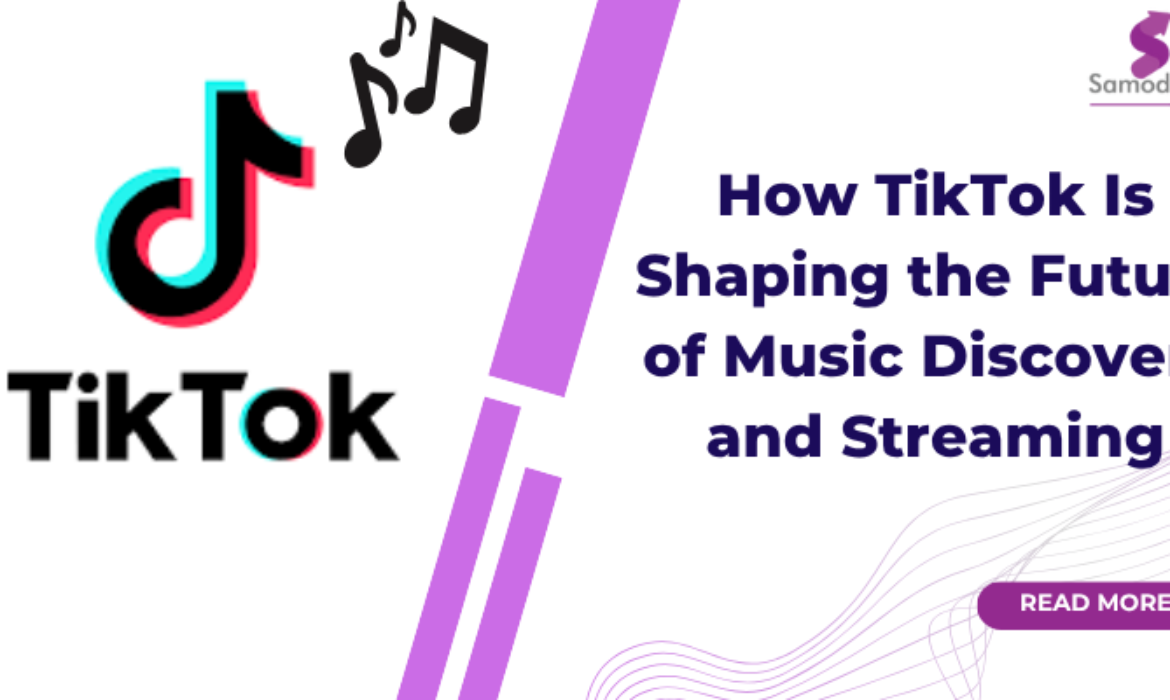
How TikTok Is Shaping the Future of Music Discovery and Streaming
TikTok has changed the way we discover, engage with, and consume music. What used to take weeks of radio play or curated playlists now happens in seconds on a 15-second video. But beyond the viral dance challenges and catchy hooks, TikTok is evolving, with its “Add to Music App” feature that creates a direct pipeline from viral clip to full-stream playback.
This blog breaks down:
- How TikTok influences music discovery and streaming
- Whether it’s a good platform to promote music
- Its overall impact on the music industry
What is the Add to Music App Feature on TikTok?
In December 2023, TikTok introduced a game-changing feature called the Add to Music feature. The goal? To leap at hearing a 15-second clip on your For You Page to stream the full track on your favorite music app as effortlessly as a tap.
This new feature is available in the U.S. and U.K. (with more countries expected soon), and it’s already transforming how users save and engage with music, while offering artists a powerful new way to convert TikTok virality into real-world streams.
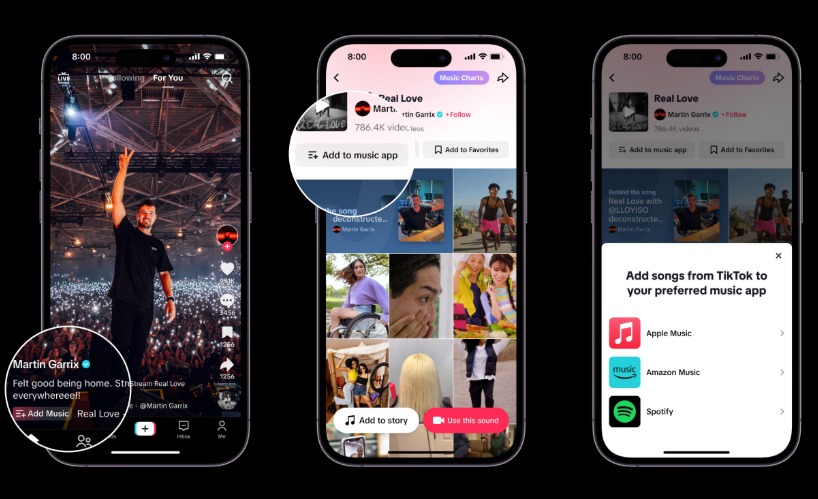
TikTok Add to Music App: Source TikTok News
How Does TikTok Influence Music Discovery and Streaming?
TikTok has become a cultural accelerator for music. Its algorithm-driven content serves up sound-backed videos that often lead users to fall in love with a song before they even know the title or artist. Research shows that TikTok users are significantly more likely to both discover and share new music content in the app, while 75% of its users also find new artists via TikTok clips.
Here’s how TikTok drives music discovery and streaming:
- Algorithmic exposure: TikTok surfaces content based on what you engage with, and music plays a big part in that. Trending sounds quickly gain traction and visibility.
- Viral loops: Users create thousands of videos using a trending sound, compounding its reach.
- In-app audio identification: You can tap the song name in a TikTok video and see other content using it, leading to deeper listening.
- Now: “Add to Music App”
This feature allows users to add a song to Spotify, Apple Music, or Amazon Music directly from TikTok. It eliminates the need to manually search for a song you liked in a video—just tap and it’s in your library.
In short, TikTok isn’t just a music discovery tool anymore—it’s a music streaming funnel.
Is TikTok a Good Place to Promote Music?
Yes, arguably one of the best right now.
Whether you’re an independent artist or a major label, TikTok offers:
- Unmatched reach: A single piece of content can go viral and reach millions without paid promotion.
- Authentic fan engagement: Fans don’t just listen; they create. TikTok encourages interaction through duets, challenges, remixes, and trends.
- Short-form storytelling: Artists can tell the story behind their music, share behind-the-scenes moments, or even test unreleased tracks.
And with the new Add to Music App integration, TikTok now gives musicians a direct path to monetization. If your song gains traction, users can easily save and stream it, turning likes and shares into actual plays.
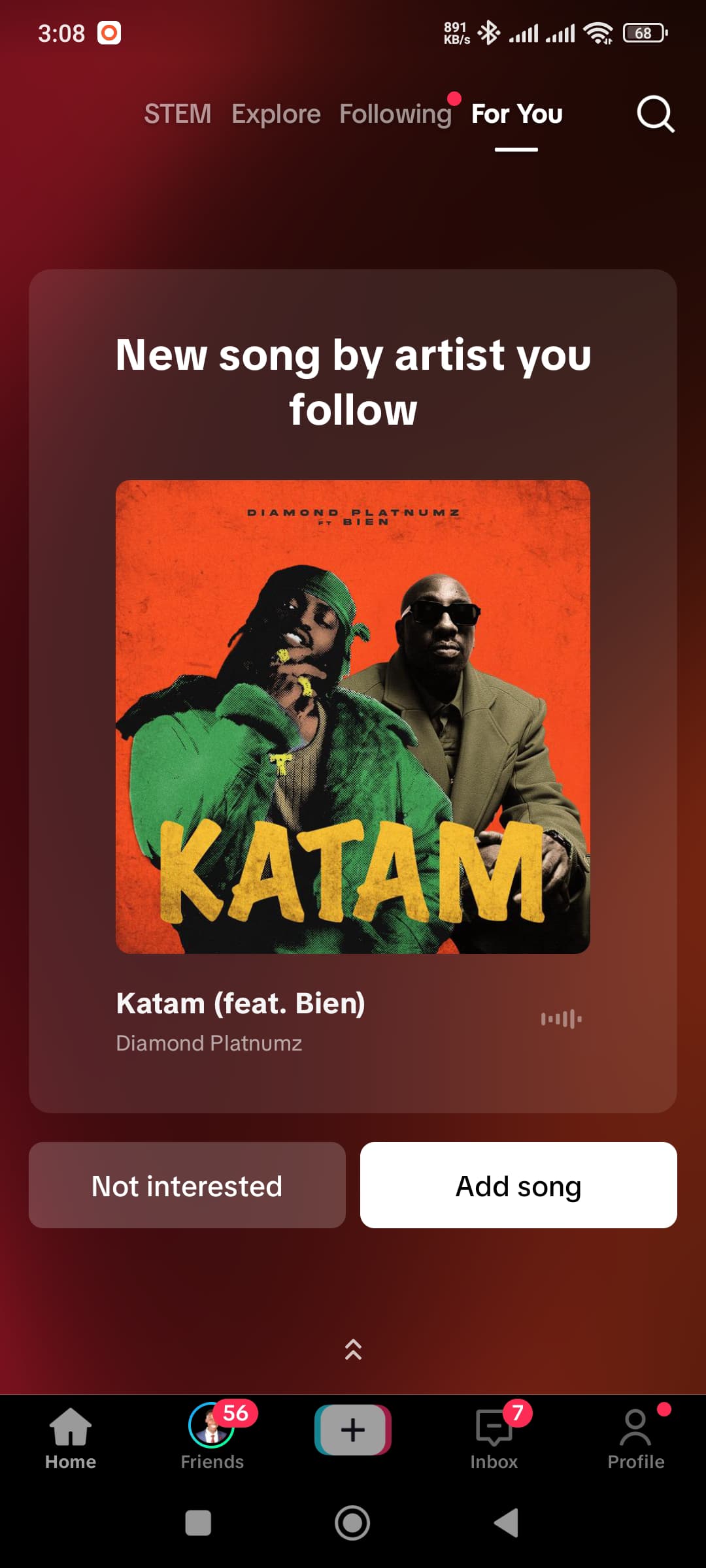
What Is the Impact of TikTok on the Music Industry?
TikTok has had a seismic impact on how music is made, promoted, and consumed for :
Artists:
- Launchpad for careers: Many artists, like Lil Nas X, Ice Spice, and PinkPantheress, gained mainstream success after going viral on TikTok.
- Data insights: Artists and labels can use real-time engagement data to decide which songs to release, promote, or even remix.
- More control for independents: You don’t need a record deal to blow up. Creativity and consistency can take you far on TikTok.
The Industry:
- Influencing charts: A viral TikTok song often climbs Billboard and Spotify charts days or weeks later.
- Shaping sound: Artists now create songs with TikTok in mind—short intros, catchy hooks, and strong beats are designed to “hit” within 5–10 seconds.
- New marketing models: Traditional music marketing has shifted toward influencer partnerships, TikTok challenges, and trend-hopping.
Listeners:
- Interactive discovery: Fans feel like they “find” a song before it hits mainstream radio.
- Faster access to music: Features like “Add to Music App” make saving and streaming immediate.
Final Thoughts
TikTok has evolved from a fun video-sharing app to a powerful music ecosystem. It blends discovery, social interaction, and streaming into one seamless experience.
Whether you’re a music lover, an artist, or a marketer, understanding how TikTok influences music—and now powers it—could be the key to unlocking new opportunities in the digital music era.
With tools like “Add to Music App” becoming more visible in the For You Feed, TikTok is no longer just about trends—it’s about what’s next in music.
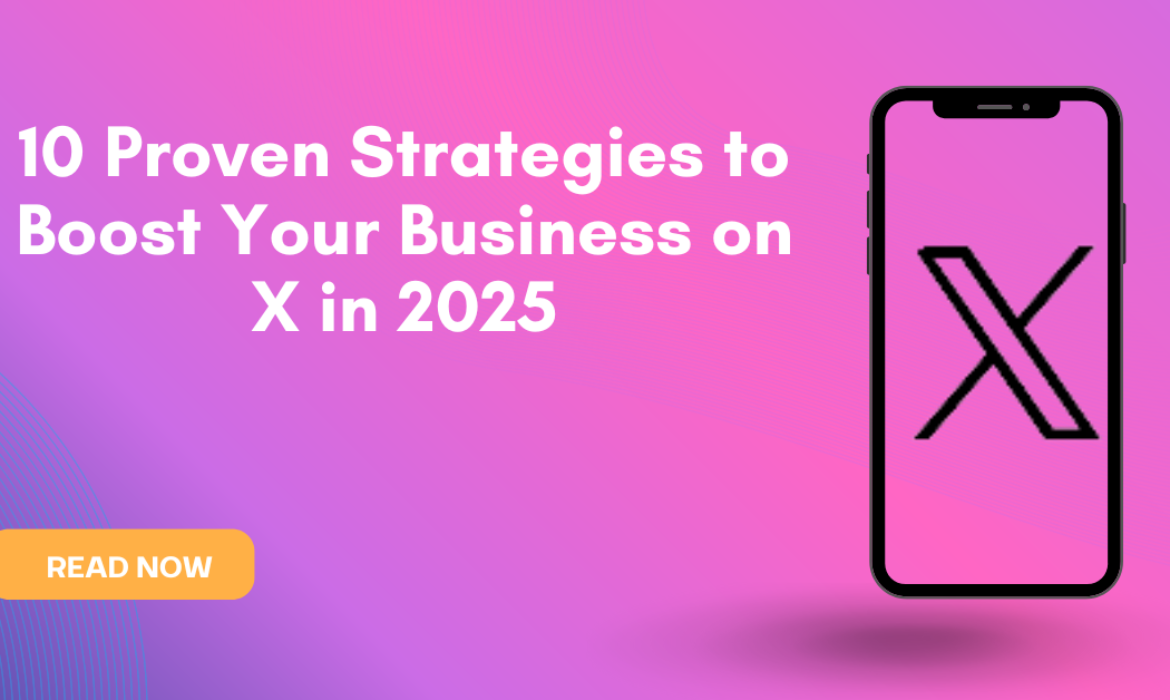
10 Proven Strategies to Boost Your Business on X in 2025
X formerly Twitter remains a powerhouse for real-time engagement, thought leadership, and customer connection in 2025. For marketers, brands, social media managers, businesses, solopreneurs, and creators, mastering X can drive visibility and conversions. In this article we share 10 actionable strategies to elevate your presence on X platform.
1. Optimize Your Profile for Maximum Impact
The first thing you need to do on X is to optimize your profile. Craft a profile that stands out. Use a clear logo or headshot, a professional header. Also have a bio that nails your brand’s value proposition. As you craft your bio, include niche-specific keywords and a link to your website to boost discoverability and conversions.
You can also add location and link to your other platforms or website.
2. Post Consistently with Diverse Content
Having an account on X without posting won’t bear you fruit. You need to post content consistently.Aim for 1-2 daily posts to stay visible without spamming followers. Mix text updates, images, short videos, and polls to keep your feed engaging. Data shows visuals and emojis can lift engagement by 30%. Keep posts concise (under 280 characters) for X’s fast-moving feed.
If you need to post content beyond 280 characters, you need to subscribe to X Premium. Understand the different features offered and go for the one that you can afford. X Premium also promises to boost your visibility on X.
3. Prioritize Real-Time Engagement
On X users expect quick responses 59% use the platform for news and updates. Therefore, you need to reply to comments, mentions, and DMs promptly to build trust. Moreover, you also need to join trending conversations in your industry to establish authority and use relevant hashtags to expand reach. This enhances visibility on the platform and helps you grow your brand and build an engaging community.
4. Embrace Video and Audio Features
X is doubling down on video and audio in 2025. Over time, they have made enhancements on video features such as introducing the ability to upload longer and 4K high quality videos. With that in mind, you need to create short-form videos (e.g., product demos or behind-the-scenes clips) to capture attention. Besides posting videos, you can also host Spaces for live audio discussions on industry topics to connect authentically with your audience. You can have thematic areas and recurring days when you are hosting Spaces.
Our Corporate Banking clients are at the heart of our success. With a customer-first approach and a comprehensive suite of solutions, I&M Bank is your partner for sustainable business growth.#IMBank #OnYourSide pic.twitter.com/Jo5MxJVgD6
— I&M Bank Kenya (@imbankke) May 26, 2025
5. Tell Stories That Resonate
Trends come and go, but storytelling drives conversions. There are different approaches to story telling. You can share customer success stories, company updates, or relatable insights. Repurpose high-performing content from Instagram or TikTok, but tweak it for X’s conversational vibe.
While on a routine wildlife health assessment in Meru National Park, the Meru Mobile Veterinary Unit encountered a solitary plains zebra stallion that had distanced itself from its herd. The zebra showed signs of severe pain, lack of appetite, and difficulty walking—prompting an… pic.twitter.com/aM3rGhhH5x
— Kenya Wildlife Service (@KWSKenya) April 24, 2025
6. Leverage Analytics for Smarter Posting
Use X analytics or tools like Hootsuite to identify peak engagement times and track performance. Nowadays, X analytics can show you when most of your audience are most active. Make use of this to know when best you can post content for maximum visibility and engagement. To add on, you need to conduct monthly audits to monitor follower growth and engagement rates, benchmarking against industry standards to refine your strategy.
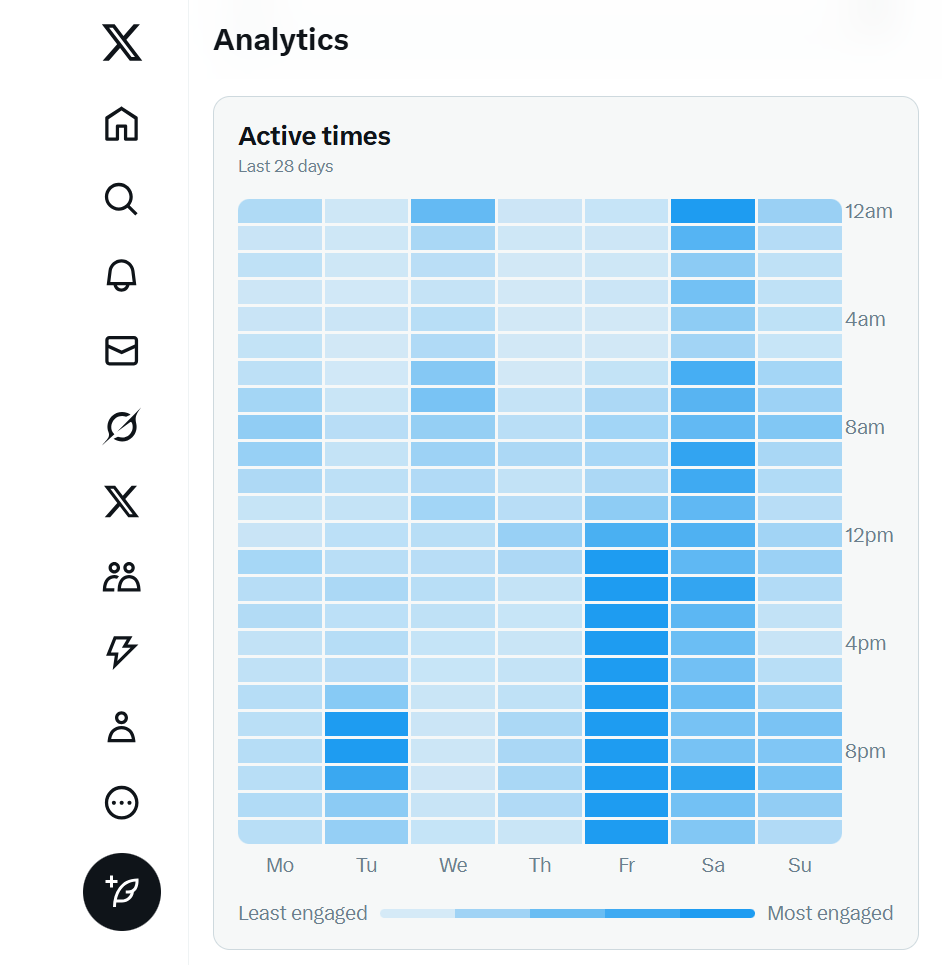
7. Build an Email List for Control
X’s algorithm and ownership shifts can affect visibility. Besides that, an outage can appear and your audience will be in the dark. You need to build and email list and drive followers to your email list with compelling CTAs, like exclusive offers or newsletters, to maintain direct audience access.
8. Invest in Paid Promotion
Over time, the organic reach on social media platforms has declined, hence you need to boost your reach with paid ads. X leaning pay-to-play, consider ads or boosted posts to ensure reach. Target by interests or demographics for precision, and amplify high-performing organic content for better ROI. To start running your ads go to X ads manager. Alternatively, you can contact us at Samodigital to help you set up converting ads on X.
9. Collaborate for Growth
Another strategy that works like magic on X is partnering with influencers. Be strategic and Partner with micro-influencers or complementary brands to expand reach. Tag non-competing creators in posts to encourage reshares. Engage in X communities or niche discussions to build credibility and attract followers.
10. Stay Agile with Platform Changes
Just like any other social media platform, X keeps evolving with new features, tweaks in algorithms. X’s ad landscape and X continues to evolve its AI tools, with its Grok AI chatbot now able to generate images, including ad variations, based on text prompts. You also need to test new formats like X Money for monetization potential and see how they help you grow. and use tools like SocialBee to streamline scheduling and monitoring.
Adapt quickly to stay ahead.
Why X Matters in 2025
X’s real-time nature makes it ideal for customer service, PR, and thought leadership. Its audience (56.8% male, 43.2% female, mostly 25-34) is highly engaged, especially in the U.S. and Europe. Combine X with 2-3 platforms like LinkedIn or Instagram to maximize impact. For ad pricing or subscription details, visit X Premium.
Focusing on authenticity, engagement, and strategic testing, you can turn X into a growth engine for your brand in 2025.
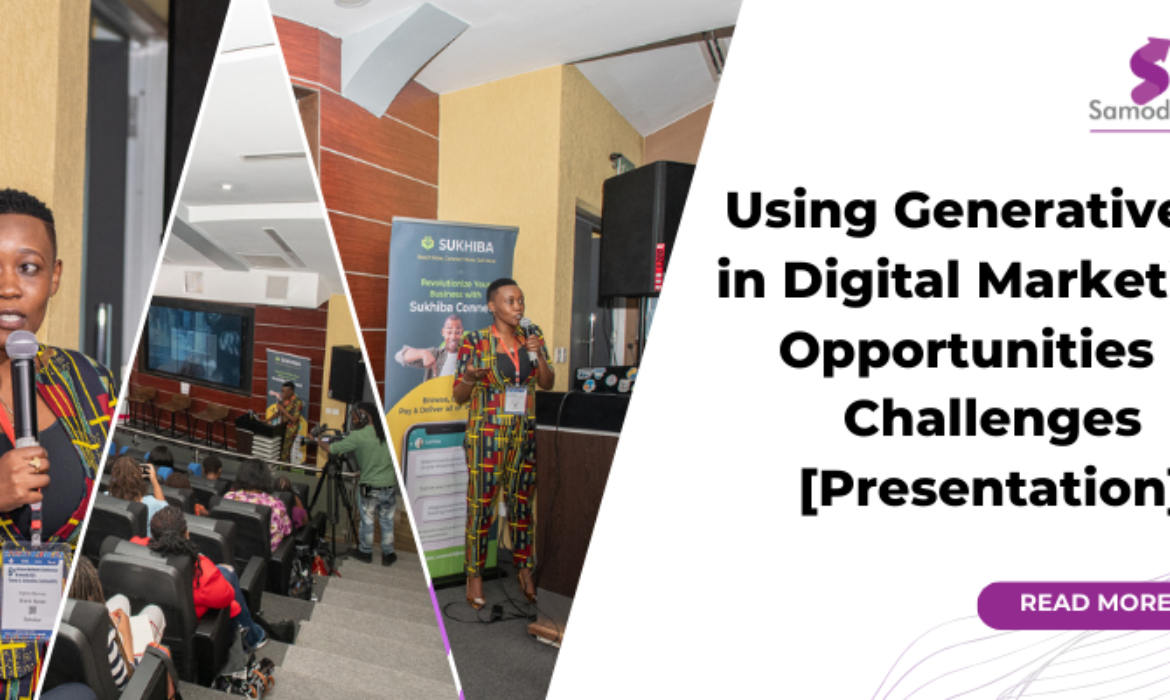
Using Generative AI in Digital Marketing: Opportunities & Challenges [Presentation]
Generative artificial intelligence became popular in 2023 thanks to the release of ChatGPT in November 2022. It has become a hot topic for marketers and businesses with each trying to see how they can weave in generative AI in their marketing strategy or day-to-day operations.
On 1st December 2023, I was privileged to give a talk on Using Generative AI in Digital Marketing at the 6th Marketers Conference and Awards 2023 in Nairobi, Kenya hosted by the Top Marketers Club.
What are the opportunities and what are the challenges for digital marketers in Kenya? In this article, I will give a summary of the points that I touched on at the conference. Here is how it started.
What is Generative AI?
Generative AI refers to deep-learning models that can generate high-quality text, images, and other content based on the data they were trained on according to IBM Research. Simply put, it includes language learning models that generate texts like ChatGPT, Bard or text-to-image such as Stable Diffusion, Midjourney, and DALL·E 2 among others.
The generative AI market is projected to reach USD 110.8 billion by 2030, and 80% of organizations have already adopted generative AI or plan to do so in the next three years.
What are the Benefits of Generative AI for Marketers in Kenya
I also touched on the benefits of generative AI. I mentioned that generative AI in marketing offers benefits such as:
- Creating high-quality visuals with fewer resources
- Enhanced content creation
- Personalized customer experiences
- Improved efficiency and productivity
- Improved customer service
- Trend forecasting and predictive analytics.
9 Generative AI Opportunities for Marketers in Kenya
Now let’s look at some of the opportunities that generative AI presents for digital marketers
-
Content Generation
Have you started using AI tools to create content? Generative AI presents opportunities for content generation, including content idea generation, converting long-form content to social media posts, creating content outlines, writing the first draft of content, writing press releases, and conducting content research and data analysis. For content generation, you can use tools like ChatGPT or Jasper AI
-
Search Engine Optimization
Also, generative AI can assist marketers with search engine optimization by conducting competitive and keyword research, creating SEO titles and meta descriptions, generating content, and editing and proofreading drafts. You can use tools like Surfer, Bard and ChatGPT to get keywords and cluster keywords.
-
Video Creation and Editing
Moreover, generative AI can be used for creating and editing videos, including explainer videos to introduce new concepts or products, promotional videos for marketing purposes, and product demos to showcase features and benefits. You can use tools like Virbo AI, Synthesia, Designs.ai and Rephrase.ai
-
Image Creation
You can use AI text-to-image platforms to create images for your social media posts, blog cover ads and even your infographics. It’s time-saving and you can play with different elements. Some of the popular text-to-image websites include Imagen, DALL-E 2, Midjourney and Stable Diffusion
-
Voice Generation
Voice generation using AI allows marketers to create unique audio content with customized brand voices for advertisements and marketing campaigns. It also enables businesses to develop AI-generated voice-overs for commercials, podcasts, and interactive advertisements, as well as realistic voice-overs for animations and video games. Examples of AI voice generators include Replica Studios, Lovo, and Synthesys.
-
Chatbots and Virtual Assistants
Generative AI can enhance chatbots and virtual assistants by improving natural language processing, personalizing customer interactions, automating content creation, generating insights from data, creating creative content, automating lead nurturing, analyzing sentiment, providing proactive customer service, supporting multiple languages, and continuously learning. This allows marketers to deliver personalized, engaging, and data-driven customer experiences, ultimately driving business growth and success.
-
Sentiment Analysis
ChatGPT’s natural language processing capabilities make it a powerful tool for sentiment analysis, enabling businesses to gain insights from customer feedback, reviews, and social media interactions. Marketers can harness this power to uncover customer sentiment trends, identify potential issues proactively, craft tailored customer service responses, predict future customer needs, track brand reputation, and make data-driven decisions that enhance customer experiences.
-
Hyper-Personalization
We are now used to personalization but generative AI takes personalization to a new level by predicting and generating content based on customer preferences, allowing businesses to deliver more personalized experiences that customers are more likely to engage with. This can include creating custom promotional offers, personalized shopping guides, or unique user experiences tailored to each customer.
-
Automating Process
AI tools that combine public and private AI models with CRM data are becoming increasingly popular for businesses. These tools can help businesses automate tasks, generate personalized content, and gain insights from data. They are often built on robust AI platforms, enabling them to integrate seamlessly with existing business systems. An example of this is Einstein GPT integrated into Salesforce CRM
Challenges of Using Generative AI in Marketing
Some of the challenges that come with using generative AI in marketing include
-
Hallucination
Hallucination in AI refers to the generation of outputs that may sound plausible but are either factually incorrect or unrelated to the given context. It leads to misinformation and disinformation and users may lose trust in the
-
Copyright infringement
Also, generative AI models can be trained on copyrighted data without permission, generating outputs that mimic copyrighted works or creating counterfeit products.
-
Bias, Stereotypes, Discrimination
While Generative AI is powerful and versatile, can also introduce biases and stereotypes into marketing campaigns if not carefully considered and implemented.
-
Data Privacy Issues and Breaches
As you know, generative AI models often require vast amounts of personal data for training and operation, raising concerns about data collection practices and the potential for misuse of this sensitive information.
-
Ethical Issues and Regulations
Lastly, generative AI is a powerful tool with the potential to revolutionize marketing, but it also raises significant ethical concerns and data privacy challenges. To ensure responsible and ethical use of generative AI in marketing, companies must prioritize transparency, fairness, data security, and compliance with relevant regulations.
Conclusion
To conclude, generative AI is revolutionizing digital marketing globally. It allows you to generate high-quality content, personalize experiences, and automate tasks. While it is promising it has inherent challenges that a marketer needs to know such as hallucination, bias and privacy issues. Marketers must stay informed and tap into the power of generative AI



